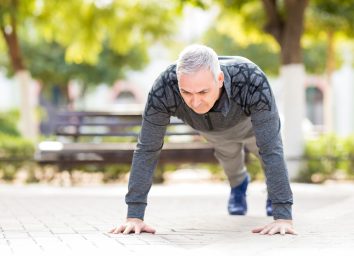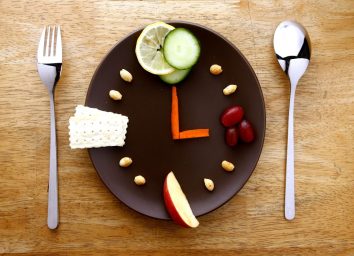6 Drinking Habits That Are Aging You Faster, Say Dietitians

Trying to maintain your youthful glow feels harder and harder as you get older, and The Mayo Clinic pinpoints several factors that can lead to an aged exterior: smoking, spending too much unprotected time in the sun, and forgoing moisturizer. Those who partake in these activities regularly tend to end up seeing more wrinkles and a tougher-looking dermis. Not only do we have to face the fact that our exterior is changing with age, but our interior is as well. Frontiers in Public Health states that as you get older, you may need to be more aware of conditions such as cardiovascular disease, diabetes, and dementia because your risk for these may increase. While we can’t stop aging from happening to us, there are certain factors—like our diet and nutrition—that may be able to help us slow it down. In fact, you may even have regular drinking habits that are already aging you faster.
For example, drinking beverages that are high in sugar, alcohol, and even artificial sweeteners on a consistent basis may be accelerating the aging process from the inside out, and keeping track of exactly how you drink can spell the difference between maintaining a healthy glow and developing more wrinkles and other bodily signs of aging, as well as making sure you feel your best on the inside with every passing. year.
In order to identify which drinking habits are aging you faster—both inside and out—Eat This, Not That! asked a handful of dietitians about which beverages you may want to limit, and which ones you may want to add to your daily routine. Read on to learn what they had to say, and for more healthy aging tips, make sure to check out The Best Supplements To Slow Aging.
Not incorporating fiber into your beverages
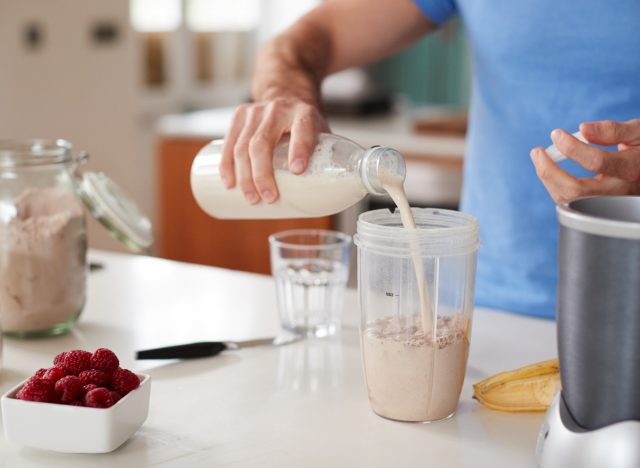
Fiber is a crucial nutrient when it comes to slowing down the aging process, and there are easy ways you can incorporate it into your drinks. According to Nutrients and Nutraceuticals for Active & Healthy Aging, fiber consumption is linked to a reduced risk of age-related disease because of its ability to help lower inflammatory and stress markers in the body. Not only that, but the same report says that not getting enough fiber can speed up your aging process.
So, how can you get fiber through a daily beverage? The answer is a delicious homemade smoothie. Fruits and vegetables are excellent sources of fiber, so blending them up with some milk or non-dairy alternatives can give you a balanced, fiber-filled snack or breakfast. When it comes to fiber, smoothies are also better than juices because even though a fresh-pressed juice may offer you a handful of helpful nutrients, the process removes most of the fiber from the produce.
Not getting enough water
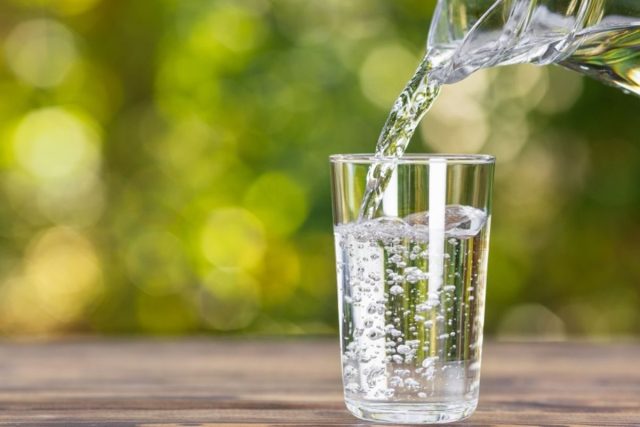
At the end of the day, one of the keys to looking and feeling younger lies in drinking enough water and staying hydrated. Anyone who forgoes basic glasses of water may unknowingly age themself in the process.
“Adequate hydration is important throughout life, as water provides the environment for metabolic reaction, as well as a building material for body parts including the skin,” says Mindy Haar, Ph.D., RDN, a registered dietitian and assistant dean at New York Institute of Technology’s School of Health Professions.
In fact, recent research published in The Lancet revealed that chronic dehydration was a major factor in speeding up the aging process, and that it may even shorten your lifespan by way of chronic disease or premature death.
“‘Plain water tops the list of ideal suppliers of necessary liquid, along with unsweetened tea and coffee helping as well. Drinking the right beverages throughout life supplies the body with the raw material to maintain optimal functioning. Less healthful choices may be associated with chronic diseases, sub-par immune systems, and broken bones, which all can decrease the quality of life as one ages,” says Dr. Haar.
Downing too much soda every day
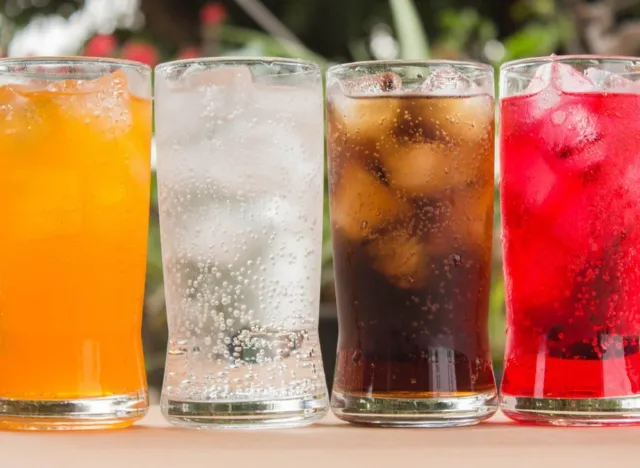
Drinking sugary soda every day can lead to a variety of long-term problems, and unsurprisingly, sugar is the main culprit.
“Aside from weight gain, sugar stimulates the production of bad cholesterol, which increases the risk of cardiovascular disease,” says Edibel Quintero, RD, a registered dietitian and Medical Content Author at Health Reporter. “Moreover, it promotes premature aging and can lead to autoimmune diseases like lupus and rheumatoid arthritis.”
Research shows that soda’s impact on aging and increased risk of disease doesn’t stop there. According to a study published in Nutrients, consistently drinking soda and other sugary beverages was associated with greater risk of coronary heart disease and type 2 diabetes. Soda has also been found to actually speed up the aging process of cells in your body, according to the American Journal of Public Health.
You don’t have to ditch your soda habit forever, but lowering your intake and replacing it on occasion with things like sparkling water or an apple cider vinegar soda.
Drinking a ton of sugary juice

Even if you ditch soda, you aren’t totally out of the woods. Despite its healthy public image, juice can contain high levels of added sugar that can keep you from feeling your youngest, so drinking sugary juices on a consistent basis may be a drinking habit of yours that is aging you faster. According to a study presented by the American Association for Cancer Research, drinking two or more sugary drinks a day was associated with a greater chance or premature aging than those who just one per week.
For an alternative with less added sugar, Quintero suggests, “drinking water flavored with lemon, strawberry, mint, or [another] favorite fruit.”
Relying on artificially sweetened beverages
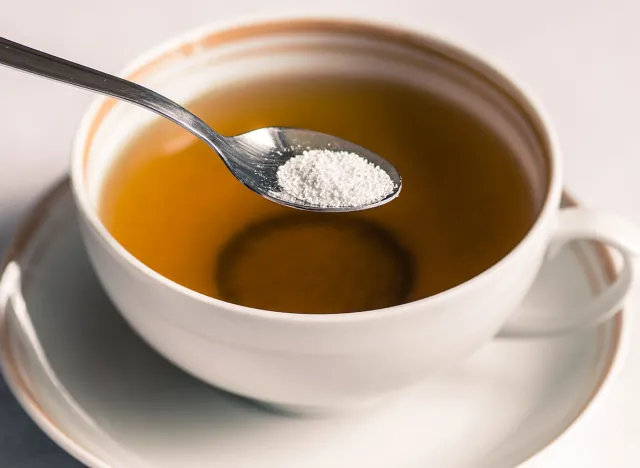
If you make the decision to switch out a soda or juice for diet beverages that are sweetened with sugar substitutes, you might unknowingly do equal damage to your aging process.
“While many people switch to beverages with non-nutritive sweeteners such as sucralose (Splenda), research has shown that not only do many people drinking diet soda not lose weight, some studies show they consume more calories than those drinking sugar-sweetened soda,” says Dr. Haar.
“Also, your microbiome, the community of helpful bacteria in the gut that helps with digestion and the immune system, may be affected negatively by sucralose, according to preliminary animal research,” says Dr. Haar. The microbiome has also been linked to skin health, so making sure it’s healthy can be key in maintaining a healthy complexion.
Guzzling alcohol

Anyone who overindulges in beer, wine, and spirits might face problems holding onto their youth. So if you want to feel your best in your golden years, go easy during happy hour.
“Alcohol can lead to more accidents, as well as falls and fractures that have more devastating effects as one gets older,” Dr. Haar says. “In addition, overconsumption of alcohol is associated with certain types of cancer and liver damage, and in women, may exacerbate previous conditions such as osteoporosis, diabetes, and high blood pressure. Alcohol may also affect the metabolism of medication, and as many older adults take daily medication, they may be more affected by alcohol overuse.”
A previous version of this story was published on June 20, 2022. It has been updated to include additional copy and proofreading revisions, additional research, and updated contextual links.
- Source: https://www.mayoclinic.org/healthy-lifestyle/adult-health/in-depth/skin-care/art-20048237
- Source: https://www.ncbi.nlm.nih.gov/pmc/articles/PMC5732407/
- Source: https://link.springer.com/chapter/10.1007/978-981-15-3552-9_6
- Source: https://www.thelancet.com/journals/ebiom/article/PIIS2352-3964(22)00586-2/fulltext
- Source: https://www.ncbi.nlm.nih.gov/pmc/articles/PMC6723421/
- Source: https://www.ncbi.nlm.nih.gov/pmc/articles/PMC4229419/
- Source: https://www.aacr.org/wp-content/uploads/2022/11/Aging22_AbstractTitlesOnly_11-16-22.pdf
- Source: https://ajph.aphapublications.org/doi/pdf/10.2105/AJPH.2013.301556
- Source: https://www.frontiersin.org/articles/10.3389/fnut.2022.848392/full
- Source: https://www.ncbi.nlm.nih.gov/pmc/articles/PMC6920876/

